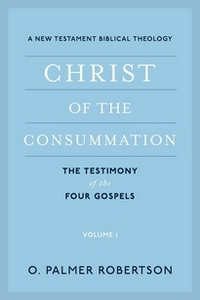 Christ of the Consummation:
Christ of the Consummation:
A New Testament Biblical Theology
Volume 1: The Testimony of
the Four Gospels
DETAILS: Publisher: P & R Publishing Publication Date: June 1, 2022 Format: Paperback Length: 321 pg. Read Date: August 7-28, 2022

In these new phases of redemptive history, the heart of the revelation does not change, but it broadens and deepens in the realities of the truth. Jesus Christ is the same, but his church, his precious bride, is being built by the addition of nations being born in a day as a consequence of Christ’s pouring out the gifts of his Spirit on all flesh. The kingdom of God has come and continues to come. The kingdom of God is yet to come. It will arrive in all its fullness on that day, the great judgment day, the day of resurrection and restoration of all things. To God be the glory for the things he has done, is doing, and yet will do.
What’s Christ of the Consummation, Volume 1 About?
At some point when reading Vos’ Biblical Theology most readers like me* start to wonder, “How is he doing to have time to cover the New Testament? While Vos doesn’t give his readers the same kind of insight into the history of revelation of the NT as he does the OT, he does set out some principles. Robert’s work is the first book-length attempt to apply Vos’ directions to apply his method to the NT (actually, the first of three book-length attempts).
That’d be people who didn’t know what was coming from pre-knowledge about the book or reading the Table of Contents.
He begins by stating the difference between the two works—there are centuries upon centuries of history of OT revelation, and a maximum of one from the announcement of Jesus’ birth to Mary to the end of John’s writing on Patmos. But that doesn’t mean that there’s no development, but how best to approach that? Robertson focuses on three distinctives in his approach:
- Retracing the Historical Progression across the Various Phases of New Covenant Revelation as the Organizing Principle
- The Foundational Role of the Old Covenant Scriptures
- Contemporary [to their writing] Application of New Testament Biblical Theology
With these distinctives in mind, Robertson looks at material concerning Jesus’ self-testimony; various phases of His life and work; the progressive revelation of the Kingdom during His life; His death, burial, resurrection, and ascension; and then he moves into closer looks at the various Gospels individually and corporately.
An Unexpected Bonus
A number of times throughout the text Robertson will hit pause on his exegetical work, the historical reflections, or the interpretative/theological conclusions from those, to offer application to the lives and hearts of the reader. Sometimes a broader or more general call and sometimes it’s a narrow focus. I really didn’t expect these at all, and I almost never saw them coming when he did pause for one. But I appreciated them all and found them to be a real enhancement to the work.
So, what did I think about Christ of the Consummation, Volume 1?
I’m clearly not qualified to evaluate Robertson’s application of Vos, but people like D.A. Carson and Richard Gaffin are, so I’ll take their word for it. Sure, they wrote the forward and a “further word” for this book, so it’s not like we’re talking about impartial evaluations.
Nor am I capable of—or willing to—give this a good and thorough review/evaluation. Although I do wish I could. So let me offer a few thoughts from my perspective as a lay reader. And I do think this is a book written with the layman in mind—it’s not a casual read by any means, but it is not a book solely for scholars.
I’m not sure I’ve read a Christian book this year that has made me think more, read slower/closer, and pushed my thinking more. It’s also been the most rewarding and I think it will prove the most fecund for my future reading, study, and devotion.
At the same time, the number of times that I read something I don’t think I’d ever been exposed to, or that was wholly novel to me is so small as to be negligible. This is not to say that it was all review or that he didn’t make me stop and think for a minute or ten to consider a point before moving on. But on the whole, it’s a reframing and refocusing of many things I’ve read in lay-friendly works or heard in sermons/lectures. It’s not “here’s a whole new way to read/think about the Gospels”—and Robertson would be the last to want something like that. Instead, this is a “here’s a way to profitably consider the way these things were revealed” and “here’s how the Gospels build upon one another and build up each other.”
I’m already trying to figure out when I can get in a re-read without ruining plans for next year—possibly in combination with a re-read of Vos’ Biblical Theology so I can more directly see for myself the connections between the two works and Vos’ influence.
This is the first in a trilogy—if the rest of the trilogy is as good as this one, the series will likely end up on shelves everywhere next to Vos. I know I’m already ready to dive into the next volume.

This post contains an affiliate link. If you purchase from it, I will get a small commission at no additional cost to you. As always, the opinions expressed are my own.
![]()




1 Pingback